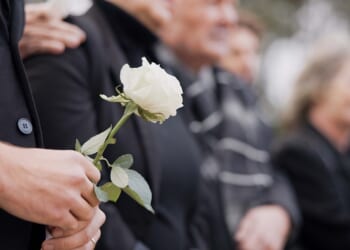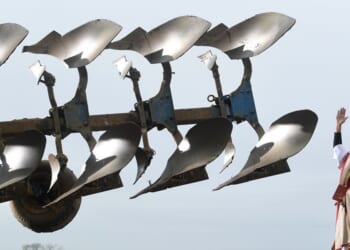Correspondents’ addresses must be supplied and will be published in full in print unless requested otherwise. But the web page will display only the place name (and/or “address supplied”). The Editor reserves the right to edit letters.
Mutual flourishing, WATCH, and the issue of abuse
From the Bishop of Coventry
Madam, — I write in response to the assertion made by the chair of WATCH, the Revd Martine Oborne (Letter, 14 November), that the arrangement in place to support the House of Bishops Declaration and its Five Guiding Principles “creates a fertile environment for sexism and abuse”.
Having served as a priest and bishop in several dioceses, including Chichester and Sheffield (where there is a significant representation of both female and Society priests), I strongly reject this claim. I have experienced very supportive and collaborative relationships with each of the Provincial Episcopal Visitors who have served alongside me generously as assistant bishops, in both the Northern and Southern Provinces. Each one is deeply committed to the building up of the Church and the encouragement of the people in their care.
The concept of “mutual flourishing” is born out a desire to hold together, recognising that what unites us is far stronger than what divides us. In every place I have served, I have encouraged sisters and brothers to work hard to find ways to “maintain the highest possible degree of communion”, This is costly work. Love is costly.
I do recognise and have also experienced the kind of microaggressions that can and do happen at every level. These are entirely unacceptable and simply have no place in the Church. They must be named and challenged. To use the term “abuse”, however, is dangerous. If we have learned anything in recent years, we know that for victims and survivors of church-based abuse, their lives have been for ever changed at the hands of those whom they had every right to trust.
The work that we are doing now to address this and to build healthier, safer, and kinder communities is costly, certainly for survivors, but also for us all. Love is costly, but it demands the best of us, and it requires that we take great care with our language, as well as our lives.
SOPHIE COVENTRY
Coventry
From Mr Tom Middleton
Madam, — The Revd Martine Oborne writes of “bringing the 2014 arrangements to a generous end”, and yet her letter displays anything other than generosity, in so doing falling well outside the mutual flourishing to which the Church of England is committed.
I know at first hand that the Provincial Episcopal Visitors (PEVs) and also the Bishop of Fulham under the London Plan exercise a ministry that is both self-sacrificial and a witness to the sacramental practice of the universal Church, which can be accurately described — borrowing language from elsewhere — as representing the “global majority”. Other Anglicans do, of course, see things differently, but may we please prioritise our common calling to reclaim our nation’s Christian inheritance as opposed to dwelling on our areas of disagreement.
I would particularly emphasise that the wild and unfounded claim of a link to abuse which appears towards the end of Ms Oborne’s letter does not do any of us in the Church of England any favours. Rather, we would be well advised to highlight Pope Leo’s and King Charles’s admirable ecumenical initiative last month in Rome as something around which we can all coalesce.
TOM MIDDLETON
London EC4
Are young people considering vocations earlier?
From the Principal of the College of the Resurrection, Mirfield
Madam, — In 1945, Mirfield received 86 applications for a place to prepare for ordination. Of those, 35 were aged 16-18, and 26 listed their occupation as “schoolboy”. Some must have been wondering whether to “stay on” into the sixth form after taking their School Certificate or to take an apprenticeship.
Today’s young people are wondering whether to saddle themselves with student debt that must be repaid alongside a lifetime’s rent, to take an apprenticeship, or to seek other employment. Education is increasingly for employment rather than intellectual formation and development; so young people are asking themselves and, perhaps, God what to do with their lives somewhat earlier than recent generations. For the first time since 1964, Mirfield has offered a place to someone still a teenager at the time of application.
I sincerely hope that those responsible for recognising and nurturing vocations are ready to respond to any changing patterns. It would be tragic to repeat the old mistake of sending young people away to gain life experience — so losing all their youthful energy and joyful enthusiasm — and all for the sake of a maturity that will grow just as well behind a clerical collar as without one.
MARK SOWERBY
College of the Resurrection
Mirfield
Experience of neurodivergent students in TEIs
From Mr Adam Spiers
Madam, — As a neurodivergent recent ordinand who attended one of the theological-education institutions (TEIs) mentioned in Amelia Braddick’s article (Feature, 14 November), I read with increasing alarm as I realised that my experience, and that of others with whom I am in contact, was not adequately represented.
It would not be hyperbolic to say that training for ordained ministry was one of the most damaging experiences of my adult life. Others I know, from various TEIs, are now in ordained ministry while having to deal with ongoing issues, including PTSD and depression, as a result of their time in training. I avoided this fate by being withdrawn from training after two years, in large part because of my neurodivergence, coupled with physical health issues that caused chronic pain and fatigue.
I have come to the conclusion that, while there certainly were a few individuals who seemed to act with ill intent, this is not the larger part of the problem. I have no doubt that the majority of staff at the TEI I attended, and the staff from my sending diocese, genuinely wanted the best outcome for me. What they were not always good at was listening to my needs as I expressed them rather than interpreting them through the lens of institutional power and established structures.
As a result, many neurodivergent and otherwise disabled ordinands experience training not so much as preparation for the stresses and strains of ordained ministry, but as people whose distinctive spiritual gifts are gradually crushed by institutional systems so closely aligned with the Established Church that they cannot help but act with paternalistic ignorance.
My genuine hope is that TEIs and dioceses will truly centre neurodivergent and otherwise disabled ordinands and take meaningful steps towards structural change. There are, as Ms Braddick’s article suggests, a few encouraging signs of this, but please forgive those of us who view these signs with scepticism: many of us are hurting, and some of us are mourning a life left in ruins.
ADAM SPIERS
Address supplied
Journey to unity is also about the grass roots
From Mr Andy and Mrs Liz Bebington
Madam, — We enjoyed the Revd Dr Jeremy Morris’s article (Analysis, 7 November) about the six-decade journey towards Anglican and Roman Catholic unity, but were disappointed that it concentrated so much on top-down conversations involving the hierarchy and clergy of both Churches.
Relationships between ordinary lay Christians of both denominations matter just as much and particularly when they involve couples marrying, as we did back in 1970, “across the RC/C of E divide”. It is when faced with planning a wedding or a baptism, or just regular Sunday church attendance, and wanting both your traditions involved, that the continuing debates, particularly over who may receive holy communion from whom, become painfully relevant. Friendships between bishops, or the Pope and Monarch, are good, but a married relationship needs more than their friendship to thrive.
We have been so grateful to the Association of InterChurch Families (www.interchurchfamilies.org.uk) for the support and understanding of other couples and clergy and the suggestions about how difficult situations can be taken forward. After 55 years together, we can truthfully say that being part of two Churches has enriched our faith — as, we are sure, closer links between the Churches would do for other Christians, too. We pray that ecumenical understanding and cooperation can grow at all levels in our churches.
LIZ BEBINGTON, ANDY BEBINGTON
Shirley, Croydon
House of Bishops stand in need of moral advice
From Canon Stephen Mitchell
Madam, — It is clear from Madeleine Davies’s revealing front-page story (News, 14 November) that the failure of the House of Bishops was not doctrinal, theological, or legal, but moral.
Instead of asking what are the moral injustices that needed to be righted, they became concerned with the preservation of the Church, its doctrine, and their own office.
Perhaps they felt that following true doctrine or trying to discern God’s will was the same as being moral. But such a path leads to simple obedience.
God gives us the freedom to work out our own salvation, and the moral questions must come first. How else do we judge whether a particular portrayal of God is good? On what grounds do we question past teaching of the Church?
If the Bishops are to take a moral lead, they would do well to receive, in their portfolio, papers on the moral and prejudicial issues at stake. They could well include Canon Angela Tilby’s excellent comment.
STEPHEN MITCHELL
Great Waldingfield, Suffolk
Annual returns of St John’s Guild for the Blind
From the Revd David Ackerman
Madam, — On 30 May, I was quoted in your story (News) “St John’s Guild for the Blind responds to concerns” about the governance of this charity whose main object is to “relieve the needs of persons with visual impairment and hearing impairment in particular members of the Church of England”. I was, therefore, interested to note in the Guild’s 2024 accounts that income in that year amounted to £153,421 and of this only £37,343 was spent on grants and direct charitable purposes. In comparison, the charity spent £36,232 on wages and office costs and £24,952 on investment-property expenses. Total funds of the Guild increased from £4,189,247 in 2023 to £4,273,959. an increase of £84,712.
The Guild claims that it meets the “spiritual, physical and sensory needs of people who are blind, or visually impaired, and providing resources where possible to meet those needs, to enable them to fully participate in church services and spiritual activities”. Whether its accounts reflect this aspiration is something for readers of the Church Times to judge.
DAVID ACKERMAN
London W10
Pretty Poverty report a model for other studies
From the Revd Dr John Gay
Madam, — It was very encouraging to read of the collaboration between a Church of England foundation university (Plymouth Marjon) and a diocese (Truro) (News, 14 November). For this jointly funded project, the university provided the research expertise and wrote the report, Pretty Poverty, and the diocese has the boots on the ground for engaging directly with some of the issues raised. I hope that this model will be a catalyst for future similar collaborations elsewhere.
JOHN GAY
Hon. Research Fellow, Oxford University Department of Education
Reading

















